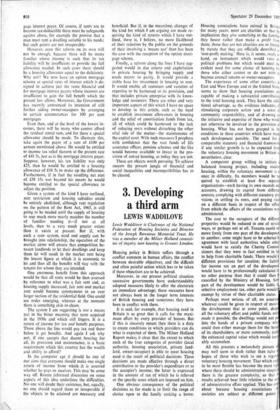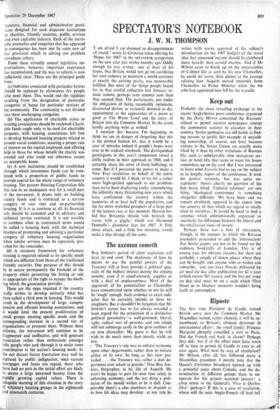3. Developing a third arm
LEWIS WADDILOVE
Lewis Waddilove is Chairman of the National Federation of Housing Societies and .Director of the Joseph Rowntree Memorial Trust. He was a member of the Milner Holland commit- tee of inquiry into housing in Greater London.
Housing policy in Britain suffers through a conflict common in human affairs, the conflict between desirable objectives, and the difficult and often painful action which has to be taken if these objectives are to be achieved.
Moreover, in our present political situation successive governments have understandably adopted measures likely to offer the electorate an immediate advantage; those measures have not always been in the longer term interests of British housing and sometimes they have been in conflict with them. -
It is said, for example, that housing need in Britain is so great that it calls for the maxi- mum effort by every provider of houses. But if this is sincerely meant then there is a duty to create conditions in which providers can do what is expected of them. The Milner Holland Report makes it clear that the extent to which each of the four categories of provider (local authority, housing association, private land- lord, owner-occupier) is able to meet housing need is the result of politicial decisions. These decisions are made effective through a direct contribution to the provider's expenditure or to the occupier's income; the latter is expressed in the amount of tax of which he is relieved or the specific taxes which are imposed on-him.
One obvious consequence of the political decisions so far made is to limit the range of choice open to the- family seeking a home. Housing associa,tions have existed in Britain for many years; most are charities so that by implication they give something to the families they house rather than make a profit from them; those that are not charities are so limited by statute that they are officially described as `non-profit making.' Here is, it seems, ready to hand, an instrument which would raise no political problems but which -would meet the evident need for some choice of housing for those who either cannot or do not wish to become council tenants or owner-occupiers.
The experience of some other countries in East and West Europe and in the United States seems to Show that housing associations are capable of making a substantial contribution to the total housing stock. They have the add' tional advantage, so the evidence indicates, of _ stimulating corporate action and a sense of community responsibility, and of drawing on the initiative and expertise of those who would not otherwise be involved in the provision of housing. What has not been grasped is the conditions in these countries which have ma such development possible. The need for comparable statutory and financial framewo if any similar growth is to be -expected fro the voluntary housing movement in Britain I nevertheless, clear.
A competent group willing to initiate balanced housing project, including studen housing, within the voluntary movement is once in difficulty. Its members would be r quired to. ,.establish at least five separa organisations—each having its own records an accounts, drawing its capital from differe sources, complying with different statutory pr visions in settling its rents, and paying rat on a different basis in respect of the offic from which the affairs of the associations we administered.
The cost to the occupiers of the differe properties would be reduced in one of sever ways, or perhaps not at all. Tenants could n move freely from one part of the developme to another; some might have to be selected agreement with local authorities whilst othe would have to satisfy the Charity Comm sioners that they were in fact entitled in la to help from charitable funds. There would different provisions for taxation; the habil' for income tax on part of the develop would have to be professionally calculated f no other purpose than that it could then cancelled by the Ministry of Housing. So part of the development would be liable f selective employment tax, other parts would exempt by virtue of their charitable status.
Perhaps most serious of all, no assura -whatever could be given in respect of most the development that 'at some point, des all the voluntary effort and public funds wh. made it possible, the dwellings would not p into the hands of a private company win could then either manage them for the ben
• of its shareholders, or more commonly; rea the enhanced capital value which would ire ably accumulate.
All this presents a melancholy picture may well seem to dash rather than raise hopes of those who wish to see a vigor voluntary housing movement. That which ou to be most flexible has become the most ri where there should be administrative simpl there is the greatest complexity, so that results achieved bear little relation to the of administrative effort applied. This has c about because' housing associations societies are subject at different points statutory, financial and administrative provi- sions designed for such disparate institutions as charities, friendly societies, public services and even capitalist industry. Each of the inevit- able anomalies and inequities that has appeared in consequence has been met by some new ad hoc provision which in solving one problem introduces others.
From these virtually annual legislative im- provisations, however, important experience has accumulated, and the way to reform is now sufficiently clear. These are the principal guide lines: (a) Subsidies associated with particular houses should be replaced by allowances for people who need them. This would end the rigidities resulting from the designation of particular categories of house for particular sections of the community. The community is not divided into these unchanging categories. - (b) The application of charitable status to housing associations should be reviewed. Charit- able funds ought only to be used for charitable purposes, with housing associations left free to develop balanced housing projects related to present social conditions, securing a proper rate of interest on the capital employed, and offering help to those for whose benefit the charity was created and who could not otherwise secure an acceptable home.
(c) A new institution should be established through which investment funds can be com- bined with a proportion of public funds to provide capital for the whole range of voluntary housing. The present Housing Corporation fills this role in an inadequate way for a small part of the movement. It draws only on building society funds and is restricted to a narrow category of cost rent and co-partnership housing. If it is to continue at all, its financial role should be extended and its advisory and technical service restricted. It is not sensible to combine what in continental terms would be called• a housing bank with the technical business of promoting and advising a particular category of voluntary housing -organisation when -similar services must be separately pro- vided for the remainder.
(d) A statutory• framework for voluntary housing is required related to its specific needs which are different from those of the traditional friendly societies. One purpose of this should be to secure permanently the freehold of the property whilst permitting the letting or- sale as appropriate of the right to occupy the dwell- ing which thellssociation provides.
These are the steps required if the country really wishes to develop -seriously what has been called a third arm in housing This would result in the development' of large, compre- hensive and efficient housing associations, and it would limit the present proliferation of small groups meeting specific needs and the corresponding increase in a second tier of organisations to promote them. Without these reforms, the movement will continue to be fragmented and ineffective, and will generate frustration rather than enthusiasm amongst able people who seek through it to make some contribution to the nation's housing needs. In the not distant future frustration may well be replaced by public indignation; once current mortgages and loans are repaid, those who have had no part in the initial effort are likely to secure, a large unearned bounty from the rapidly growing capital values. There is adequate warning of this situation in the story of voluntary housing groups in the eighteenth and nineteenth centuries. -











































 Previous page
Previous page